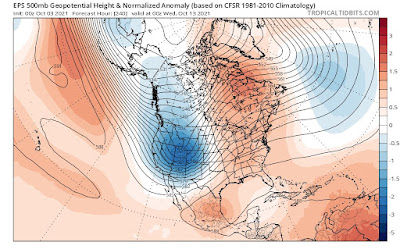In this climate change world, the weather has not gotten the memo.
Late season heat records have been broken in a LOT of places at a remarkably fast clip in late September and early October.
In just the first two days of October, hottest temperature for the month records have been broken or tied in four nations. These are 114.8 degrees in Iran; 110 degrees in Morocco; 102 degrees in China and 90 degrees in South Korea, according to meteorologist Scott Duncan, in a thorough recent thread on Twitter.
The Canary Islands also hit an October record at 101 degrees.
While I was visiting the Great Plains about a week ago, in the final days of September, record heat had engulfed that area, and that hot weather extended well into Canada. Where I was staying in Yankton, South Dakota, temperatures exceeded 90 degrees three days in a row.
Hazen, North Dakota reached 100 degrees on September 28, which is likely the furthest north on record the temperature has gotten that hot that late in the season.
More than two dozen heat records were broken in Saskatchewan, Canada in the last week of September, including 92 in Regina.
While we in Vermont are not experiencing record heat, we're certainly escaping the kind of chill we often see this time of year. Temperatures are expected to stay above normal all of this week and very likely beyond that, and daytime highs will poke up into the 70s on some days.
Nights once again have been particularly warm. It was 58 degrees early this morning in Burlington, a temperature that would not at all be unusual for that time of day in July.
Most places in the Green Mountain State have not yet seen their first autumn frost this year. Most of Vermont usually sees its first frost of the season right about now. That's not happening this week. Probably won't happen next week, either.
We're not yet at the stage at which the first frost would set records for lateness. Records for latest first frosts are right around Halloween.
The persistent warmth is forecast to continue across the eastern half of North America at least through mid-month. This will include well above normal temperatures far to the north.
This is turn, could keep water temperatures above normal in the Great Lakes, Hudson Bay, and the myriad of lakes in Quebec and Ontario. Chances are these bodies of water will also start to freeze over later than usual, too. This is especially true if the warm pattern holds into November.
That could mean a very cloudy early winter here in Vermont. When it's relatively cold, moisture rises from the comparatively warm waters, which make the skies over the Northeast and southeast Canada very cloudy. The very weak sun of November and December can't do much to disperse those clouds.
The cloudiness, if it happens, would also tend to produce frequent bouts of light snow and flurries here in Vermont during the early winter. There would also be a greater chance of heavier lake effect snows downwind of the larger lakes, especially in western New York.


No comments:
Post a Comment